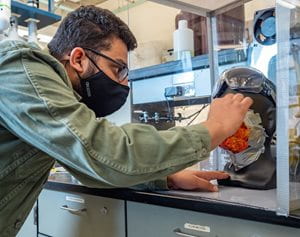*Fit means more than fabric.
Have you wondered how effective your cloth mask is in protecting you from the COVID-19 corona virus? We wondered that too, and this led to our newest research project—studying the effectiveness of cloth face masks. Shahbaz Qureshi, a 2020 UWB Biochemistry graduate, and Praphulla Boggarapu Chandra, postdoctoral researcher, have been working with Dr. Dan Jaffe on testing mask effectiveness. Their research was featured on KIRO 7 news, where Dan Jaffe was interviewed by reporter Jessica Oh.

The preliminary research results show that for filtration, fit is more important than the mask material: Tight-fitting masks were twice as efficient in stopping aerosol particles as looser masks. “All masks reduce the particulate—the aerosols you’re putting out in the world and the aerosols you’re breathing in—both ways to some degree,” Jaffe said. “If you wear it properly and you have a tight-fitting mask, it reduces it a lot more.” Dr. Jaffe also plans to present the mask problem to his Quantitative Environmental Analysis class in the upcoming Autumn quarter. “Students will for themselves see: How good is my mask, and how important is the fit?”
Watch the KIRO7 news video on the mask research
Read more about the mask research on the UW Bothell News page